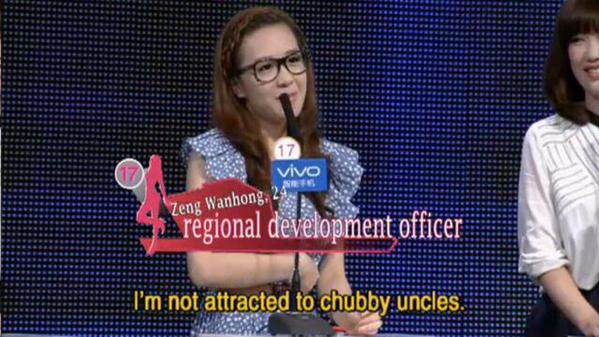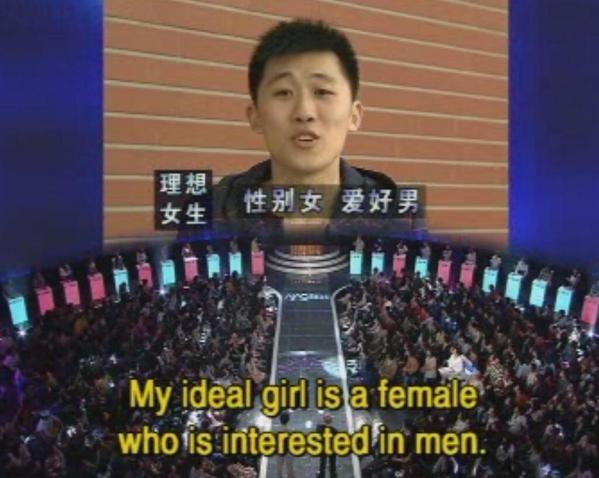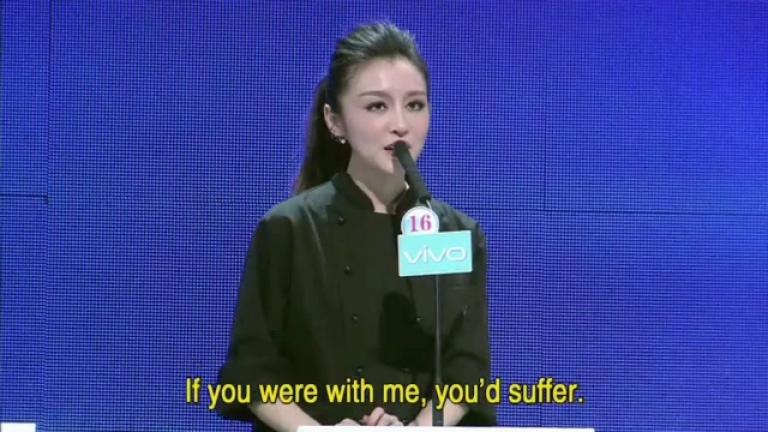Entertainment News – “I haven’t said hello to you because I don’t think you deserve it,” a young woman coolly informs a would-be suitor.
“If I was your girlfriend, would you let your belly be my pillow?” another chirpily asks her plump admirer, who is visibly bewildered.
 “When you came on stage you looked like a noodle,” a third woman tells the slim young man in front of her. “Sorry.”
“When you came on stage you looked like a noodle,” a third woman tells the slim young man in front of her. “Sorry.”
Bold, blunt and deliciously weird, China’s biggest TV dating show is wildly popular in the one market where the show is broadcast for an English-speaking audience: Australia.
‘If You Are The One’ — in Chinese, ‘Fei Cheng Wu Rao’ — has become an unlikely hit for Australia’s youth-oriented SBS2 channel since the network decided to start broadcasting it with English subtitles in 2013.
Such is the show’s success with Aussies that producers have launched a casting call here for 28 men and women to fly to China in December and appear in two Australian specials.
Its popularity has surprised even SBS2’s executives, who were initially skeptical that their viewers would care to watch a matchmaking show entirely in Chinese. After the first two seasons, however, it was clear that audiences loved it. Within the past year ‘If You Are The One’ has become one of the small public broadcaster’s most-watched shows.
“It consistently outperforms other programs on the channel with its loyal and enthusiastic following,” says channel manager Caleb James.
The concept is simple: one male contestant faces 24 single women. The jovial host, Meng Fei, might invite the guy to demonstrate a special talent, play testimonials from his friends and family or show him being interviewed backstage. And of course, the girls get to ask him questions — personal and often painfully direct questions.
On the basis of his answers the female contestants judge the man either worthy or unworthy of a date, and signal their decision by leaving on or switching off a light in front of them. If any lights are left on by the end of the round, the male candidate chooses between the willing women and takes one of them on a vacation.
The format is, in fact, Australian. ‘If You Are The One’ is loosely based on a show called ‘Taken Out’ that first aired in Australia in 2008. While the concept was successfully exported to several other countries, the Australian original was a flop. It folded after a single season.
Meanwhile in China the show exploded after its launch in 2010, reportedly attracting up to 50 million viewers per episode. Its makers, Jiangsu Satellite TV, now bill it as the world’s biggest dating show.
What makes Australians prefer the Chinese version of the show to their own? Part of the appeal is just how brutally honest the contestants can be.
Every weekend the show’s dedicated Australian following takes to Twitter, Tumblr and online forums to revel in the candidates’ latest quirks. Under the hashtag #ifyouaretheone, fans post screenshots that capture the funniest, most shocking or simply absurd comments their favorite contestants have made.
One of the Australians who understands the show best is Joe Sweeney, one of a handful of Westerners to have taken part. He was living in China when producers picked him out of the audience to appear as a contestant in 2013. Apart from the challenge of competing in Chinese, he told GlobalPost, he also had to confront cultural differences.
producers picked him out of the audience to appear as a contestant in 2013. Apart from the challenge of competing in Chinese, he told GlobalPost, he also had to confront cultural differences.
One female contestant, for example, asked Sweeney if he would consider moving in with her parents in Beijing, a practice not uncommon in China.
“I had to think hard to figure out how to handle that one,” he says. Luckily for him, he was eventually spared from answering this delicate question on air.
When he returned home, Sweeney never expected the show would be a hit in Australia.
“It’s tremendous, people like my mother watch the show religiously every weekend,” he says.
“The moment you get in you get hooked,” agrees Jing Han, head of the subtitling department at SBS, who has written the English subtitles for more than 150 episodes.
She doubts, however, that ‘If You Are The One’ would have found similar popularity five years ago.
“Australia is a very Western-based country — Asian culture is only slowly getting interesting [to it]. Now, people are more curious; that was necessary for the show to be a success.”
An influx of Asian immigrants has made Australia an increasingly multiethnic country. The number of Australian residents born in China doubled within 10 years, rising from about 200,000 in 2004 to almost 450,000 in 2014. Australia has cultivated close economic ties with China, which is now its largest trading partner ahead of Japan and the US.
From Chinese brands to Chinese neighbors and Chinese food, China and its culture are becoming a prominent feature of many Australians’ everyday lives — even if much of that culture remains foreign.
‘If You Are The One,’ Han believes, doesn’t just entertain its Australian viewers but helps them better understand China and its people. “The show draws candidates from all over China and from all different walks of life, something very rare for Chinese TV,” she explains.
Non-Chinese contestants have remained rare, however — until now. The upcoming Australian specials will be the most diverse episodes to date. While all contestants must be fluent in Mandarin, according to Han, several non-Asian candidates have applied.
For Chinese contestants and their parents, such diversity might not be easy to take. Australian candidate Joe Sweeney left the show without a date when the woman he had chosen rejected him, saying her parents might not approve of a relationship with a foreigner. After living in China for two years, Sweeney says that her decision didn’t surprise him.
Tastes can change, however.
“A recent British contestant — looking very British — was able to keep every Chinese female candidate interested in him at least in the first round,” Jing Han says. “This was the first time a Western-looking man achieved that.”
There might be hope yet for single Australians looking for romance on their favorite Chinese dating show.
By Stefanie Knoll, Global Post

